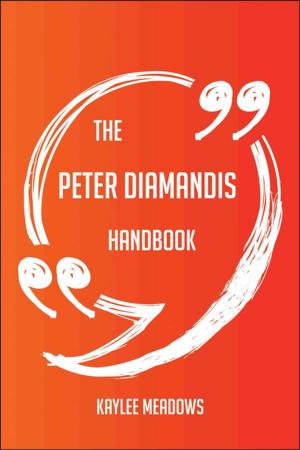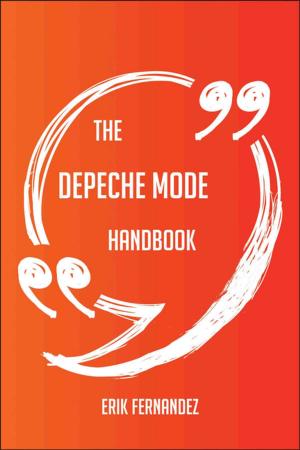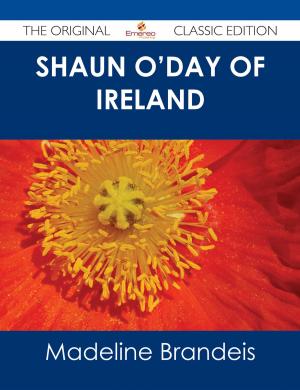The Tempest - The Original Classic Edition
Nonfiction, Reference & Language, Reference, Fiction & Literature| Author: | Shakespeare William | ISBN: | 9781486415410 |
| Publisher: | Emereo Publishing | Publication: | October 24, 2012 |
| Imprint: | Emereo Publishing | Language: | English |
| Author: | Shakespeare William |
| ISBN: | 9781486415410 |
| Publisher: | Emereo Publishing |
| Publication: | October 24, 2012 |
| Imprint: | Emereo Publishing |
| Language: | English |
For many years, the exiled Duke of Milan Prospero has lived on a remote island with his young daughter Miranda. But when he discovers that his treacherous brother Antonio and his similarly treacherous friends are nearby on a sailing ship, he summons a storm that causes the ship to crash on the island.
And like a puppet-master, Prospero arranges this as he wants -- he sends his servant Ariel to haunt the men who betrayed him, he thwarts the machinations of his evil servant Caliban, and he pretends to treat Alonsos son Ferdinand badly while secretly matchmaking him with Miranda. In the end, everything will be as he desired.
The Tempest is a play with two different dimensions. On one hand, we have a simple story about a mage whose power allows him to manipulate everything in his little domain. And on the other, we have the story of a brilliant storyteller who arranges his own little worlds as he sees fit, and bids farewell to his role (Now my charms are all oerthrown/And what strength I haves mine own...)
And appreciated on its own, The Tempest is a brilliant play -- Shakespeare juggled the three main plotlines nicely, and brought a solid sense of resolution to the story. His rich dialogue is stunning (But doth suffer a sea-change/Into something rich and strange/Sea-nymphs hourly ring his knell...), especially during Ariels songs and Prosperos speeches. Even the insults are brilliant -- just try yelling A pox o your throat, you bawling, blasphemous, incharitable dog! at someone you dont like.
Prospero is a rather unique character -- he rules over his little island with magical powers, sort of like a local demigod. Everything that happens on the island is because he wants it to be so, but hes a sad, benevolent figure rather than a tyrannical one. And Shakespeare sketches up an intriguing cast of characters, both mortal and immortal -- the ethereal, puckish Ariel and grotesque Caliban, the naive Miranda, and the contemptible trio of onetime conspirators.
O brave new world, That has such people int! cries Miranda at the end of The Tempest, and while not every character in it deserves a brave new world, the play itself feels like a weekend trip into a magical world.
For many years, the exiled Duke of Milan Prospero has lived on a remote island with his young daughter Miranda. But when he discovers that his treacherous brother Antonio and his similarly treacherous friends are nearby on a sailing ship, he summons a storm that causes the ship to crash on the island.
And like a puppet-master, Prospero arranges this as he wants -- he sends his servant Ariel to haunt the men who betrayed him, he thwarts the machinations of his evil servant Caliban, and he pretends to treat Alonsos son Ferdinand badly while secretly matchmaking him with Miranda. In the end, everything will be as he desired.
The Tempest is a play with two different dimensions. On one hand, we have a simple story about a mage whose power allows him to manipulate everything in his little domain. And on the other, we have the story of a brilliant storyteller who arranges his own little worlds as he sees fit, and bids farewell to his role (Now my charms are all oerthrown/And what strength I haves mine own...)
And appreciated on its own, The Tempest is a brilliant play -- Shakespeare juggled the three main plotlines nicely, and brought a solid sense of resolution to the story. His rich dialogue is stunning (But doth suffer a sea-change/Into something rich and strange/Sea-nymphs hourly ring his knell...), especially during Ariels songs and Prosperos speeches. Even the insults are brilliant -- just try yelling A pox o your throat, you bawling, blasphemous, incharitable dog! at someone you dont like.
Prospero is a rather unique character -- he rules over his little island with magical powers, sort of like a local demigod. Everything that happens on the island is because he wants it to be so, but hes a sad, benevolent figure rather than a tyrannical one. And Shakespeare sketches up an intriguing cast of characters, both mortal and immortal -- the ethereal, puckish Ariel and grotesque Caliban, the naive Miranda, and the contemptible trio of onetime conspirators.
O brave new world, That has such people int! cries Miranda at the end of The Tempest, and while not every character in it deserves a brave new world, the play itself feels like a weekend trip into a magical world.















